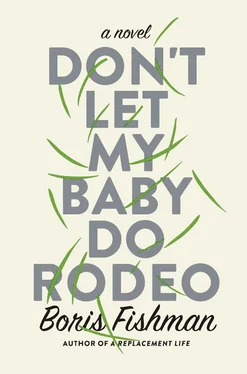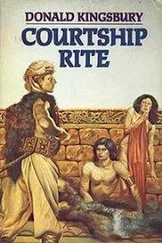“But he’s eight,” Alex said. “It’s been eight years.”
“Until we are adolescents, and even beyond,” Bender said, staring off into the window, where the sun suffused the parking lot, “every day is a new world. Add to that having to get used to a whole other culture.” Bender tried on a poetic summation: “For him, it’s a new world squared.”
“So what do you propose?” Alex said.
“You should be glad you came to see me,” Bender said. “An American therapist wouldn’t answer that question for thirty sessions. Milk your teat a bit first.” He caught himself. “Forgive my language, Maya.” Then he realized that his phrasing had also reminded his patients of their infertility. He ground his teeth.
“The boy is a boy,” Bender said secretively. “He’s growing. And childhood is a mystery.” Alex was prepared to receive these words as a confirmation of his view that there was nothing especially wrong with Max, and that everyone around him loved to panic. But then Bender swerved away. “Clearly, the boy is acting out some kind of fantasy,” Bender said. “So: Guide his fantasy. Take charge of his fantasy.”
Maya did not understand. Did Bender want her to run away with her son? But how? Max had not alerted her of his disappearance.
“You are wondering how,” Bender read her mind. “I’ll tell you how. Select him a new name. Let him choose it. Also, acquire him an animal. Again, let him say which. His choices — they will say things.”
But what if he chooses a snake? Maya thought. Or a rhinoceros, for God’s sake. Maya deplored the way certain specialists — dentists, mechanics, accountants, apparently psychologists also — gave out results without explaining how they had arrived at them.
“That is, of course,” Bender said, “if Eugene will tolerate an animal on his carpets. In six months, come back, if you wish. Though”—Bender leaned forward conspiratorially—“I think you won’t need to come back.”
“That’s it?” Maya asked feebly. “A new name and an animal?”
“Once more,” Bender said wearily, “most therapists will take ten months — and ten months of billing — to tell you that. But I am a healer. My goal is to heal, not supervise monologues while I plan a vacation.” He folded his lips modestly and opened his right hand. Maya and Alex turned around to see where he was pointing. But Bender was merely showing the Rubins the door — time was up.
In the reception room, their son, having surrendered to Bella’s ministrations, was gnawing on a candy bar. Maya was perplexed — Max was customarily indifferent to sweets, the one child in the world. Perhaps it was easier to overcome his disinterest in candy than to fend off the receptionist’s siege. Bender followed Maya and Alex out of his office. “I asked Max what he thinks of his mother’s condition,” he announced to everyone. Bella looked up from the computer and Max stopped chewing. “He believes his family suffers from an overly relaxed attitude toward returning friends’ phone calls.” Bender giggled. With that, he spun on his heel and ran inside his office before the Rubins had a chance to respond. Maya had forgotten all about the questions she had meant to ask the psychologist.
+
The drive back home was less fraying than the drive out. The roads out multiplied, multiplied, multiplied until the great green signs above the roadway forced a driver to choose between six lanes and four highways; the roads back fed and funneled until there was only the single drive leading down to the Rubins. It was not a grand house. But they were marking their twentieth year inside it. Nothing of particular distinction had happened inside it: the occasional barbecue, a snowstorm. Longevity helps where singularity fails.
Maya and Alex had had to fight no one for the town house. It was a strange construction — no basement, a ground floor with an open design, and a cluster of bedrooms off a tight landing upstairs. It was unfitting for a standard Acrewood family, which needed a formal dining room and a basement for toys. No, the Rubins didn’t have any children. No, they didn’t know when they would. Alex attempted to explain that it wasn’t a practical home — it would make resale challenging — but Maya had pleaded with him. The architecture made her feel open, unboxed. They had Filipinos, always smiling, next door, an old Italian who made his own wine on the other side, and up the drive a retiree now devoted full time to enforcing development code, such as when Alex was alerted by the management office that he had painted their garage door the wrong shade of off-white. They all lived in standard Acrewood homes, and Maya loved when the plum-colored darkness swallowed them up.
Inside, the clutter Maya had tried to keep away was eventually introduced anyway by the inability of the elder Rubins to refrain from buying things for their children. Within Eugene and Raisa, the immigrant desire to see how much of a day could pass without the spending of money collided with the American unease at seeing the sun sink without having parted with so much as a cent. The elder Rubins resolved this conflict by refusing themselves the luxuries that they then bought for the children. In this way, every windowsill in Maya’s dining and living rooms came to be decorated by items like a set of martini glasses filled with plastic gin bobbing with plastic maraschino cherries and olives. While cleaning one weekend, Maya reached out a finger and dragged one of them off the sill by the stem. She watched it bang to the floor without breaking. Dismayed, she picked it up and put it back on the sill. There were eleven more.
“Maxie?” Maya called out to the backseat. “Have you ever wanted a different name?”
Alex shook his head at the wheel.
“Where do names come from?” Max said. The seat belt back there looked too large on him, as if it wouldn’t protect him in an accident. He was flanked by the same tray of Turkish confections, minus the one bottle Bender had kept out of politeness. Maya and Alex would have to hide the tray in the garage and empty it down pasha by pasha.
“Mamas and papas give names to their babies,” Alex said. “When they’re born,” he added carefully.
“Why did you call me Max?” Max said.
Maya wondered if this line of questioning meant that Bender was on to something. “Did Bender say something, honey?” Maya said. “I mean, Dr. Bender?”
“You take Maya — your mama,” Alex said. “And you take Alex — me. And you add them together. What do you get?” He inclined his heads toward the backseat. No answer came.
“You take the first two letters of your mama’s name, and the last letter of mine, and what do you get?” Alex repeated.
“Max,” Max acquiesced.
“See?”
“I like it,” said Max.
“He likes it,” Alex repeated.
“But that’s not what Grandma and Grandpa did with you,” Max said. “Eugene. And Raisa.” He thought about it.
“Sometimes you get named after someone your parents want to remember,” his father said. “I had a grandfather named Alex. He died before I was born. They called me Alex to honor him.”
“What’s honor?”
“You’ll learn all about it when you grow up,” Alex said. “Don’t crowd your head.”
“Honor is respect,” Maya said. “It’s when you like someone very much.” She turned back to her son. He seemed less upset than when they had left. She allowed herself to be supported by this.
“If you like another name better than Max, you can tell us,” she said. She weathered a look from Alex. “For instance, when I was little, I wanted to be called Zoya. Do you want to call me Zoya once in a while instead of Mama?”
Max shook his head.
“Okay — what if I call you Maximilian?”
Читать дальше












